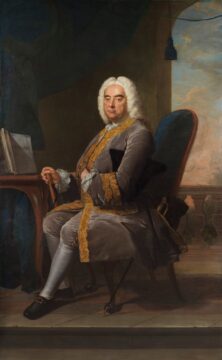John Adams in The New York Times:
 “Mr. Handel’s head is more full of Maggots than ever. … I could tell you more … but it grows late & I must defer the rest until I write next; by which time, I doubt not, more new ones will breed in his Brain.”
“Mr. Handel’s head is more full of Maggots than ever. … I could tell you more … but it grows late & I must defer the rest until I write next; by which time, I doubt not, more new ones will breed in his Brain.”
The probably feigned harrumph about the composer was aired by one Charles Jennens, a wealthy 18th-century English country squire, art and book collector, music lover, hoarder of manuscripts and all-around aesthete who some years later would provide both the concept and the text for what would become the most popular and enduring musical work of all time: the oratorio that, despite Jennens’s contribution, we know as “Handel’s ‘Messiah.’” A solitary bachelor, self-described as “puny,” Jennens was subject to depression and “violent perturbations and anxieties of the mind.” Aside from his God in heaven, the moody and melancholic impresario had one overriding passion in life: the music of his German-born composer friend, he of the maggots in the brain. For Jennens, George Frideric Handel was “the Prodigious,” a genius whose talent, fecundity and theatrical acumen dominated English musical life for nearly a half-century.
Jennens is just one of an improbable list of characters who populate Charles King’s new book, “Every Valley: The Desperate Lives and Troubled Times That Made Handel’s ‘Messiah.’” King uses Handel’s famous oratorio, what he calls “the greatest piece of participatory art ever created,” as a hub the spokes of which radiate outward to a host of key historical forces and personalities that characterize 18th-century Britain. A work of vivid social and cultural commentary, it functions also as an in-depth study of artistic creation, not only of how “Messiah” came to be, but also of the unstoppable spigot that was Handel’s musical imagination.
More here.
Enjoying the content on 3QD? Help keep us going by donating now.
